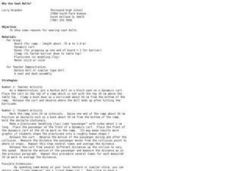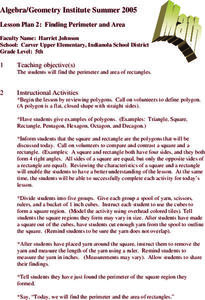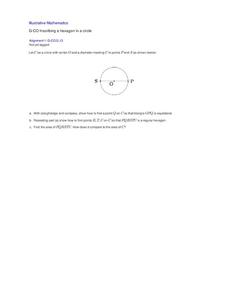Curated OER
Polyhedra
Seventh graders explore the characteristics of three-dimensional figures. They compare the nets of figures. Students describe the relationship between the nets draw and the solid. They identify the vertices, edges and faces of the...
Curated OER
HAPPY SOIL, SAD SOIL
Students will be able to identify the characteristics of healthy soil and unhealthy soil.Take the class outside to an area of thick grass near trees, if available. Compare the
clothes people wear to the thin cover. Discuss the reasons...
Curated OER
Why Use Seat Belts?
Students explore reasons why using a seat belt is a safe choice while riding in a car. In this physics/safety instructional activity, students set up and observe a doll with and without a seat belt moving down a ramp in a dynamics cart....
Curated OER
Identifying Lines of Symmetry
Students calculate the lines of symmetry using polygons. In this geometry lesson, students graph, compare and estimate using collected data. They identify different attributes to the polygons based on their sides.
Curated OER
Volcanoes: Piles of Fire
Students investigate how particle size affects the angle of a volcano's slope.
Curated OER
Reading the Shapes of Volcanoes on Earth and Mars
Young scholars compare and contrast the volcanoes of Earth and Mars, and examine specific volcanoes on Mars. They model the processes that create cone and shield volcanoes, and measure the slope angles of cone and shield volcanoes.
Curated OER
Anne Frank: Everything Changed for Us
Students write about a time they were made to feel different, and when they were on the other side of the equation. They read other first hand accounts of times in history when people were made to feel like outsiders.
Curated OER
Tangrams
Students construct the tangram pieces from a square paper by following directions to fold and cut. They make observations on the pieces formed and compare how they are related to each other. They explore patterns and shapes with the...
Curated OER
Standard Treehouse Lesson Plan
Seventh graders investigate the concepts related to the geometry of treehouses that focuses on angles that are similar and congruent. They conduct class discussion in terms of looking at three dimensional shapes that are represented in...
EngageNY
Sequencing Rotations
Discover the result of a sequence of rotations about different centers. Pupils perform rotations to examine the patterns. They also describe the sequence of rotations that performed to reach a desired result in the ninth installment in a...
Curated OER
Finding Perimeter and Area
Geometers find the perimeter and area of rectangles. They discuss the definitions and characteristics of rectangles and squares. In groups, they use yarn to discover the perimeter of squares and rectangles. They count cubes to explore...
Curated OER
Putting the 'pi' in Pumpkin Pie
Students use geometric formulas to divide a pumpkin pie. In this geometric formulas lesson, students review equations for area and circumference of a circle and divide a pumpkin pie to practice the formulas. Students use the Pythagorean...
Curated OER
Triangle Inequality Theorem
Learners use the inequality theorem to solve triangles and their properties. In this geometry lesson, students are given spaghetti of different lengths and asked to create triangles. They conclude the necessary length needed to make a...
Curated OER
Quilt Squared
Students study West Virginia quilts. In this mathematics activity, students use symmetry, geometric shapes, and patterns to create their own quilt square.
Curated OER
What are the Kinds of Triangles?
Fifth graders classify triangles. In this triangle lesson, 5th graders learn about the characteristics that make up a triangle. They are instructed through video, PowerPoint slides, and teacher-led demonstrations.
Alabama Learning Exchange
Creating a Psychology News Wiki
If you're searching for a way to keep your class informed of current psychology news, this ongoing assignment is both educational and engaging. Class members locate and read a psychology article of interest, write a psychological...
Illustrative Mathematics
What is a Trapezoid? (Part 2)
This collaborative activity investigates the meaning of a trapezoid and a parallelogram. It begins by presenting two different definitions of a trapezoid. Learners are to reason abstractly the difference between the two definitions and...
Mathematics Vision Project
Module 6: Trigonometric Functions
Create trigonometric functions from circles. The first lesson of the module begins by finding coordinates along a circular path created by a Ferris Wheel. As the lessons progress, pupils graph trigonometric functions and relate them to...
EngageNY
Congruence Criteria for Triangles—ASA and SSS
How do you know if a pair of triangles are congruent? Use the lesson to help class members become comfortable identifying the congruence criteria. They begin with an exploration of ASA and SSS criteria through transformations and...
EngageNY
Special Lines in Triangles (part 1)
Allow your pupils to become the mathematicians! Individuals explore the properties of a midsegment of a triangle through construction and measurement. Once they figure out the properties, learners use them to draw conclusions.
Mathematics Vision Project
Module 5: Modeling with Geometry
Solids come in many shapes and sizes. Using geometry, scholars create two-dimensional cross-sections of various three-dimensional objects. They develop the lesson further by finding the volume of solids. The module then shifts to finding...
Curated OER
City Streets: A Fold-up of a Street Lined with Buildings
After walking in a nearby neighborhood, have your class create this amazing city street pop-up. They study the facades of the buildings they see, focusing on geometric line, shape, and architecture. They then draw, cut, and create a city...
Curated OER
Inscribing a Hexagon in a Circle
This activity is a follow-on activity to inscribing a square in a circle. The overall problem is more complex. It deals with geometric constructions, properties of triangles, and regular hexagons. The final part of the activity finds the...
Bowels Physics
Refraction and Lenses
Every object we see must pass through a lens, but how does each individual's lens differ? Learners explore the science behind refraction and lenses, uncovering the details that allow them to perform daily activities.

























